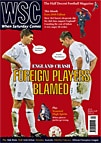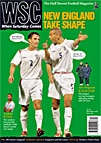Uli Hesse on the fraught play-offs to reach the Second Bundesliga in 1991
![]() 4 June ~ Twenty-five years ago Hansa Rostock won the last-ever East German cup final, but that wasn’t the end of football in the GDR. After the German reunification, East German teams were distributed into the West German league pyramid. When the Bundesliga was formed in 1963 the clubs were admitted base on a ranking calculated over the previous 12 years, yet for the teams in the GDR’s Oberliga, it came down to how they performed over just one season.
4 June ~ Twenty-five years ago Hansa Rostock won the last-ever East German cup final, but that wasn’t the end of football in the GDR. After the German reunification, East German teams were distributed into the West German league pyramid. When the Bundesliga was formed in 1963 the clubs were admitted base on a ranking calculated over the previous 12 years, yet for the teams in the GDR’s Oberliga, it came down to how they performed over just one season.



